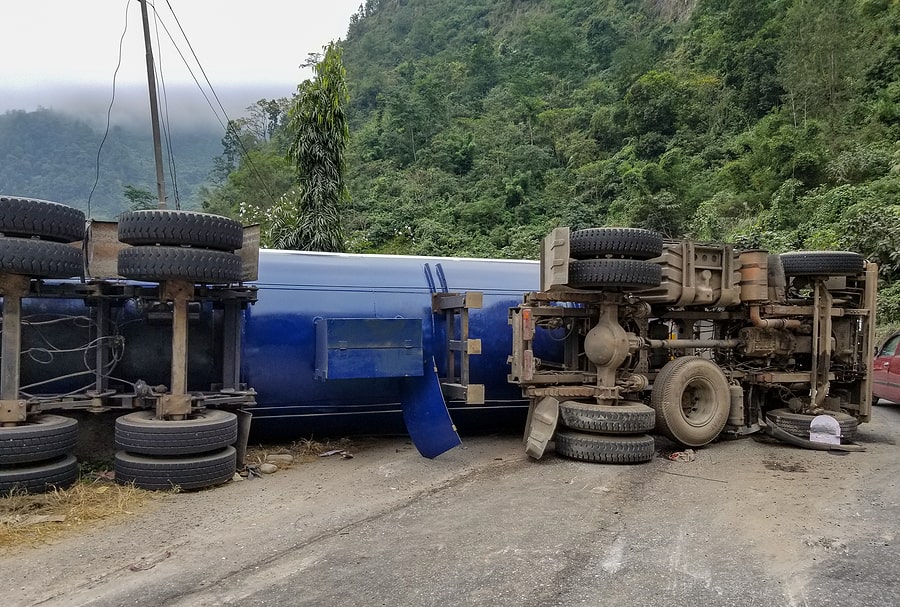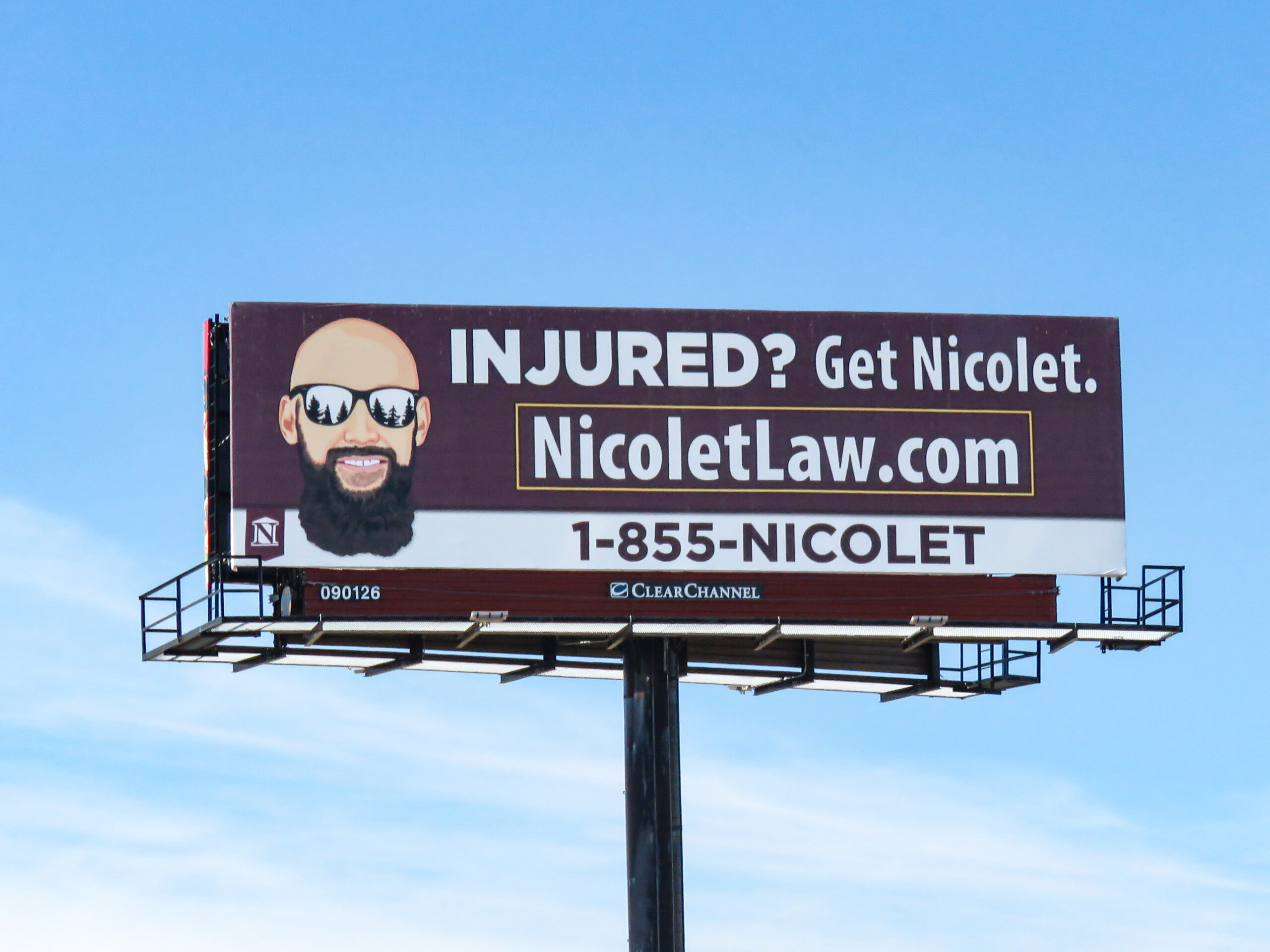Heavy trucks are large and typically weigh between 20 to 30 times more than the average passenger vehicle, giving them a less stable center of gravity and making them more prone to rollovers. Truck drivers have protection in their trucks and often suffer minor injuries in a truck accident. However, rollovers are easily the most treacherous of all truck accidents. Those involved, including truckers, often suffer severe, sometimes fatal injuries.
Below we take a closer look at how truck rollovers occur, everyday situations that lead to truck rollovers, and injuries you might suffer if you are involved in a truck rollover accident.
The Science Behind Truck Rollovers
Truck rollovers are specific types of accidents that happen under specific conditions related to a truck’s stability when it travels around a corner or curves or makes a turn. A truck’s stability depends on its center of gravity and the size of its track width, which is the distance between the right and left wheels.
The center of gravity is the location on a truck where the weight is even on each side. The odd shape of a truck makes it difficult to find the exact center of gravity. Additionally, a semi-truck will have a different center of gravity than a dump truck. Whether a truck is loaded and the distribution of the load also impacts the location of the center of gravity. The most unstable trucks have the highest center of gravity and the narrowest track width.
Now that you understand the characteristics of stability in trucks let’s take a closer look at how instability leads to a rollover. Consider an empty semi-truck. As workers load the truck, the center of gravity moves higher. A loaded semi, among the tallest trucks on the road, has the highest center of gravity, making it somewhat unstable.
When a trucker goes around a corner or curves too quickly, the gravitational force pulls the trailer’s weight away from its center of gravity. The more quickly a trucker maneuvers his big rig, the more likely the truck will skid and possibly roll over. If you notice a truck traveling too fast for traffic, road, or weather conditions, keep your distance to avoid a truck rollover accident.
Causes of Truck Rollover Accidents

The Federal Motor Carrier Safety Administration (FMCSA)—the federal agency that regulates the trucking industry—has invested extensive resources into learning about truck rollovers. Understanding these dangerous events helps them to teach trucking companies, truckers, and the public how to prevent and avoid truck rollovers.
In 2008, FMCSA researchers analyzed more than 200 truck rollover accidents in a large truck crash causation study. They found that the immediate cause of a rollover is an event that increases the roll moment about the longitudinal axis of a truck, typically turning too quickly or allowing one side of the truck to rise or drop suddenly. Sometimes another vehicle or a truck’s condition can cause a truck rollover. However, the FMCSA reported that truck driver error is the leading cause of these events.
The FMCSA Large Truck Causation Study identifies seven causes for truck rollover accidents:
Speeding
The FMCSA’s Large Truck Causation Study examined 239 truck rollover accidents and found that speed was a factor in over 35 percent of crashes.
Speed leads to truck rollover accidents when drivers:
- Travel too fast entering or going around curves
- Travel too fast for sharp turns
- Do not comply with warnings about speed
- Do not slow down to adjust to the additional weight, additional height, and lower stability of their truck
- Do not slow down when they know they have faulty brakes that need service
- Do not slow down for poor road conditions or heavy traffic
Inattentive Driving
The FMCSA study identifies inattentive driving as the second leading cause of truck rollover accidents. According to the study, drivers losing focus on the front of their trucks is the most common and dangerous type of inattentive driving. If truck drivers need to make a quick maneuver, they risk a rollover accident. Drowsy truckers and drivers caught up in other distractions can cause rollover accidents when they do not keep focused on their driving.
Losing Control of a Truck
Truck drivers who partially or fully lose control of their trucks sometimes cause a dangerous rollover accident. Bad weather, road hazards, and driver inexperience can lead to losing control.
Examples of maneuvers that sometimes cause truckers to lose control of their big rigs and cause a rollover accident include:
- Poor steering, including oversteering and understeering
- Overcorrecting for an error, sometimes resulting in swerving into other lanes of traffic
- Following other vehicles too closely when they make a quick maneuver
- A poor or inadequate reaction to other drivers on the road or hazards
- Not downshifting to decrease speed
- Improper braking
Not Scanning Intersections
Some truck rollovers, especially in small trucks, occur because drivers do not adequately scan the road. Semis and large trucks spend more time on major highways and interstates, where most rollovers occur. However, points of conflict with others on the road are low on interstates, so truck drivers do not have to worry about scanning at intersections. Smaller trucks that spend more time traveling on two-lane roads and city streets must scan and process information at intersections to make decisions about turning and changing lanes. Failure to check intersections can lead to erratic maneuvers that result in a truck rollover.
Poor Pre-operation Conditions
The FMSCA Large Truck Causation Study also examined conditions before a truck gets on the road when assessing the causes of truck rollover accidents. Causes are specific to things that occurred or were present before the truck driver got behind the wheel.
This includes:
- Improper cargo securement procedures
- Truckers who are not in a state to drive because they have an illness, have a disease, or take medication
- Failure to complete a pre-trip inspection to find potential issues that make the truck unsafe for the road
Other Drivers
Rollovers are most often a result of truck driver negligence. However, other drivers on the road can also cause a truck rollover accident. Erratic driving and quick maneuvers sometimes force truck drivers to make rapid moves with their trucks to avoid a collision, leading to a rollover. In other situations, a motorist who strikes a truck with their vehicle causes instability and loss of control, leading to a dangerous truck rollover.
Poor Truck Maintenance and Improper Loading
Truck drivers do not always have control over maintenance and loading issues that lead to dangerous accidents. Those aware of issues might choose not to drive if they are unafraid of losing their job. In other cases, truckers are unaware of maintenance or loading issues until they are on the road and it is too late. Trucking companies have a legal duty to put roadworthy trucks on the road.
They must perform regular maintenance and fix known issues as soon as possible. Worn tires can blow out and cause a trucker to lose control, potentially leading to a truck rollover. Similarly, some load configurations can change the center of gravity in a tractor-trailer, creating instability that put the trucker at risk of a rollover accident.
Truck Rollover Accidents Lead to Severe Injuries

Often, truck rollovers cause a traffic slowdown for others on the road but do not involve other vehicles. However, when a truck rollover includes other drivers, accident victims have a higher chance of dying than in different types of traffic accidents. Even small trucks like garbage, cement, and dump trucks weigh far more than the average car. More weight translates to a greater force upon impact during a rollover. This force can cause massive damage to another vehicle, leading to severe injuries.
Examples of truck rollover accident injuries include:
Head and Brain Injuries
Truck rollover accidents can cause head and brain injuries through direct blows to the head during the crash. However, accident victims can also suffer an indirect blow to the head from the crash’s impact. Either case can lead to traumatic brain injuries, leaving victims with permanent brain damage and lifelong struggles with cognitive and motor skills. Children involved in truck accidents face developmental issues when they suffer brain injuries.
Neck Injuries
Neck injuries are common in traffic accidents, but those involved in truck accidents are especially at risk because of the greater force upon impact in a truck crash. The accident’s impact forces a person’s head to move back and forth, causing damage to the soft tissues or the spinal column in the neck area, commonly referred to as whiplash. However, the force of a truck accident can tear and rip soft tissue and muscles and cause damage to vertebrae. Victims who suffer neck injuries face a lifetime of chronic pain if they do not make a full recovery.
Back Injuries
Traffic crashes cause bodies to move in unnatural positions, especially when trucks are involved. These movements sometimes lead to severe back injuries such as fractured vertebrae and bulged or slipped discs. Sometimes victims get relief from back surgery, but many still cope with some pain or discomfort for the rest of their lives. Many back injury victims must rely on addictive pain medication, continuous shots for pain relief, or a particular device implanted in their bodies if they are unable to make a full recovery.
Spinal Cord Injuries
A spinal cord injury is among the worst truck accident injuries because victims often face lifelong paralysis on top of the pain of their initial injury. The cells of the spinal cord do not regenerate like other types of cells in the body. Some truck accident victims are fortunate to the extent that they only experience temporary paralysis.
This is typically the case when the cord is bruised; once the swelling subsides, accident victims have a good chance of regaining lost function. More severe injuries permanently impact communication between the brain and the rest of the nervous system, causing permanent functional loss. The level of loss depends on the location of the injury along the spinal column.
Injuries closest to the brain cause the most loss because they block the most messages to the rest of the body.
Amputations
Motorists who are involved in an accident after a trucker loses control and rolls his rig face crushed limbs, commonly resulting in amputation. Severe accidents create conditions where drivers can get their legs or arms pinned in their vehicle. This is especially true if a truck rolls over a passenger vehicle.
Crushed limbs are slowly dying because the injury interferes with blood flow. When doctors cannot restore blood flow, they often have to amputate to save their patient’s life. Amputees face lifelong physical and emotional struggles from the trauma of losing a limb.
Burns
Tanker trucks, some semi trucks, and other types of trucks carry hazardous material (HAZMAT), including explosive, unstable, and flammable cargo. Those involved in a truck rollover risk burn injuries if a truck catches on fire or explodes. Severe burns typically require one or more skin grafts and corrective surgeries. Patients sometimes need months to heal, making burns a costly injury. Many burn victims face permanent scars adding psychological trauma on top of the unimaginable pain that comes with a burn injury.
Contact an Experienced Truck Accident Attorney After Injuries

If you have suffered injuries after involvement in a truck rollover accident, you could have a claim against the truck driver and/or trucking company to recover compensation for your injuries. If you prevail in your claim, you could receive money for medical expenses, lost wages, pain and suffering, and other damages.
Contact an experienced truck accident lawyer as soon as possible, so they can evaluate your claim and advise you on the best path forward for your circumstances.
